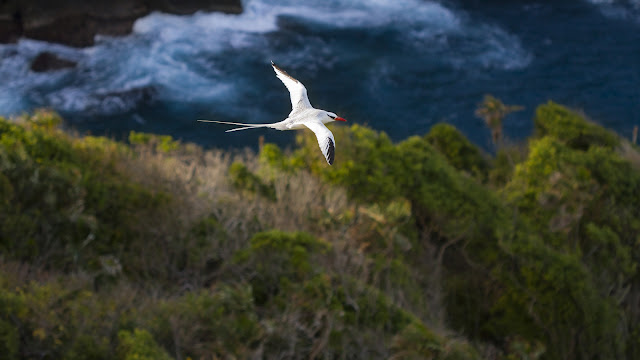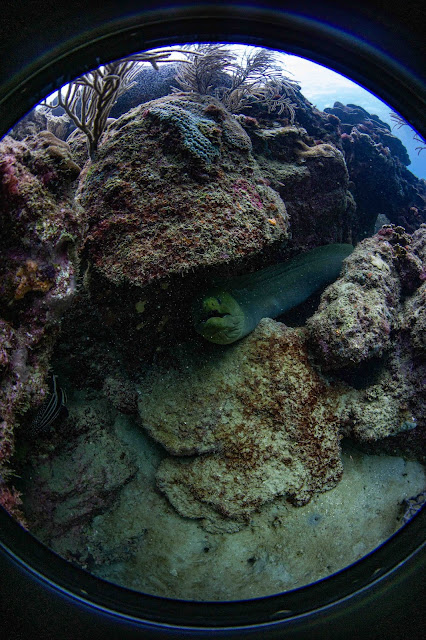Overcoming that Fear of Sharks
In recent weeks, there have been a couple of shark attacks in St Martin and St Kitts and Nevis. Rather than try to convince readers how incredibly rare shark attacks are, Dr Anjani Ganase delves into why we fear sharks and what we can do to overcome the fear (if we wanted to).
 |
| Hammerhead shark with free diver. Credit: Amanda Cotton/ Coral Reef Image Bank |
Why do we fear sharks?
The fear of sharks that we have simply does not stem from the facts about shark attacks, as the risk is incredibly low. There are a few reasons for this fear. The first driver is evolution, where much of the fears is thought to be primal. On the most basic level, that idea of being eaten by a shark is horrifying, as no one wants to be a meal. It is a fear that dates back to our ancestors who had to protect themselves against predators. Add to this, the stories that surround shark attacks by seafarers. One well-known account came from the survivors of the USS Indianapolis who were torpedoed by the Japanese during World War II. The sailors that were picked off by the sharks over the days before a rescue of the remaining was mounted, are indeed harrowing. At the same time, the circumstances were extremely unusual and unfortunate even before the sharks showed up.
Another factor that drives fear of sharks is our entertainment industry. Perhaps it started with the 1975 movie Jaws in which a Great White shark terrorised vacationers at a summer destination. It is thought that this movie singlehandedly shifted the narrative of sharks. Pre Jaws, there were incidents of shark attacks in the US and Australia, but the idea of a manhunting shark did not exist. In the 1950s, people had started recording shark attacks for research.
Post Jaws, the idea shifts to the possibility that sharks actively hunted humans. As a consequence, thousands of sharks were hunted as trophies in an effort to beat the man eaters. Paralleling this is the increase in research in shark behaviour and biology, yet today with all the information we have to show that sharks have no special interest in humans, we continue to refer to sharks as killers and villainous. This has been perpetuated by the entertainment industry which constantly feeds us sharks as villains and tales of hunters conquering the shark. What is uncertain is how much this fear contributes to their significant declines in the ocean where every year about 25 - 100 million sharks are killed. While a lot of it is in the food trade, there may be an emotional reason that we don’t prioritise the active protection of sharks despite the scientific understanding of their significant ecological importance.
 |
| Whale Shark Eating. Credit: Amanda Cotton/ Coral Reef Image Bank |
How do we overcome fear of sharks?
I am thankful that Stephen King’s Cujo never resulted in an irrational fear of dogs, otherwise we’d all be putting our pooches out to pasture. Annually there are 4.6 million dog bites in the US alone, yet it still doesn’t stop many of us from owning dogs. This is because we have a better understanding of dogs, their nature and the risks, and they are portrayed in a more balanced way and as a society we put measures into place to lower the chances of a bite. This is what we have to do, we need to take control of our fears by learning more about sharks in a balanced way so that if we hear about a shark attack, we can also identify the nature and circumstances that surround it. We should learn more about the more than 500 species of sharks present in the ocean and understand that only a handful are responsible for the majority of attacks on humans. The largest fish in the ocean is actually the whale shark that can grow up to 10 m in length and weigh up to 20 tons, yet it only feeds on krill and has no functional teeth. The shark with the longest life span is the Greenland shark which can live over 400 years and only reproduces at around 156 years. Finally, there is a shark the length of your forearm known as the epaulette shark; they can walk along the reef flat during low tide hunting for prey. In the tropics, the species of sharks that you’d most likely encounter are reef sharks or relatives of sharks, such as stingrays, eagle rays and manta rays.
To become more familiar with sharks, I encourage you to keep up to date with shark research. There are universities around the world that conduct shark research. Follow the ones in your area. For the Caribbean, research is being done in Florida, Bahamas and on several islands in the Caribbean. Research centres on understanding the habits of different shark species; researchers often track shark movements to learn their daily habits. Information from these studies will also inform better safety practices.
The biggest factor for being more prone to a shark attack is the surrounding environment. For example, you are more likely to get bitten in murky or dark waters, as most sharks use the limited visibility to hunt. So, avoid dusk and dawn swims and waters close to river mouths, especially after it rains. In Hawai’i our dive team often relocated after rainfall to clearer waters, as locals knew this was the time when tiger sharks would come close to shore to hunt. We avoided being attacked by not being in the water. This information is the basis of simple safety procedures from keeping our beaches clean and clear to having a lifeguard on duty to spot marine activity.
When you go in the water, avoid areas of fishing activity and fish cleaning. Avoid busy marine feeding activities, such as diving birds and schooling fish; chances are sharks will join the feeding frenzy. Finally, follow the local rules. The reality is that there are locations where incidents of shark attacks may increase in relation to more people being in the ocean than before, especially at places that have become popular as tourist destinations.
As a marine biologist, my work is in the ocean and shark encounters are part of the daily diving activity, especially in locations of marine management such as the Great Barrier Reef, and the Bahamas, one of the few places in the Caribbean where sharks are protected. The experience of diving with sharks is one of calm, inquisitive behaviour and respect by both parties. Sadly, these encounters have become incredibly rare.
In 2020 there were only 57 unprovoked shark attacks worldwide – ten resulted in fatalities - with only one in the Caribbean region (The International Shark Attack File (ISAF)). The only anomaly for 2020, is that the number of shark deaths are higher than normal. This may not be because sharks are becoming more vicious; but may be related to the overburdened healthcare during the covid crisis, however further investigations and monitoring in the long-term are needed to confirm. I will leave with this statistic - you have a 1 in 11.5 million chance of getting attacked by a shark; you have a better chance of winning the local lottery. Next time you feel that fear of sharks, go buy a lottery ticket!
References
Francis, B. (2012). Before AND After" JAWS": Changing Representations of Shark Attacks. The Great Circle, 34(2), 44-64.
https://www.nationalgeographic.com/magazine/2016/06/shark-species-family-tree-ocean-ecosystem-predator/
https://www.nationalgeographic.com/news/2018/01/sharks-attack-fear-science-psychology-spd/
http://www.smithsonianmag.com/history/the-worst-shark-attack-in-history-25715092/?no-ist
Elizabeth Pennisi. Greenland shark may live 400 years, smashing longevity record. https://www.sciencemag.org/news/2016/08/greenland-shark-may-live-400-years-smashing-longevity-record
The International Shark Attack File
https://www.floridamuseum.ufl.edu/shark-attacks/yearly-worldwide-summary/


